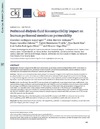Please use this identifier to cite or link to this item:
https://accedacris.ulpgc.es/jspui/handle/10553/69818
| Title: | Peritoneal dialysis fluid biocompatibility impact on human peritoneal membrane permeability | Authors: | Rodríguez-Esparragón, Francisco Marrero-Robayna, Silvia González-Cabrera, Fayna Hernández-Trujillo, Yaridé Buset-Ríos, Nisa Rodríguez-Pérez, José Carlos Vega-Díaz, Nicanor |
UNESCO Clasification: | 320506 Nefrología | Keywords: | Bicarbonate/Lactate Buffered Solution Biocompatibility Epithelial-To-Mesenchymal Transition Mesothelial Cells Peritoneal Dialysis, et al |
Issue Date: | 2018 | Journal: | CKJ: Clinical Kidney Journal | Abstract: | Background. We have compared the effects of conventional lactate-based peritoneal dialysis fluid (CPDF) with respect to bicarbonate/lactate-based fluid on peritoneal ultrafiltration (UF) and peritoneal permeability, and on variations on gene expression in cells isolated from effluents of patients' peritoneal bags. Methods. This was a non-randomized sequential prospective study including all incident peritoneal dialysis (PD) patients (n ¼ 40) recruited in our centre. Peritoneal equilibration tests (PETs) were performed using CPDF or BPDF both containing 2.27% glucose during a 48-h interval in four different sequences. Gene expression variation of selected genes was measured by reverse transcription polymerase chain reaction in mesothelial cells obtained from the total drained fluid during the PET. Results. In the overall study, the use of BPDF was associated with significantly lower mass transfer area coefficient for urea and creatinine, longer accelerated peritoneal examination test times for urea and creatinine, lower total pore area available for exchange over diffusion distance and lower UF. There were no differences in the gene expression of aquaporins 1-3, endothelial and inducible nitric oxide synthase (NOS3 and NOS2), or interleukin-6. The SNAIL and E-CADHERIN gene expression normalized ratio was evaluated in peritoneal effluents of cells obtained from CPDF and BPDF. We observed that the SNAIL/E-CADHERIN mRNA ratio decreased when the dialysis sequence started with BPDF and went on to CPDF, but not when the sequence was the opposite. Conclusion. This study shows that those patients who started PD treatment with BPDF were characterized by a better biocompatibility profile. BPDF associates with lower peritoneal permeability to small molecules and lower UF. | URI: | https://accedacris.ulpgc.es/handle/10553/69818 | ISSN: | 2048-8505 | DOI: | 10.1093/ckj/sfy043 | Source: | Clinical Kidney Journa l[ISSN 2048-8505], v. 11 (6), p. 881-888 |
| Appears in Collections: | Artículos |
SCOPUSTM
Citations
1
checked on Jun 8, 2025
WEB OF SCIENCETM
Citations
1
checked on Jun 8, 2025
Page view(s)
145
checked on May 17, 2025
Download(s)
125
checked on May 17, 2025
Google ScholarTM
Check
Altmetric
Share
Export metadata
Items in accedaCRIS are protected by copyright, with all rights reserved, unless otherwise indicated.
